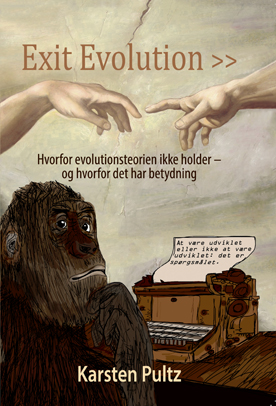Our Danish correspondent Karsten Pultz, author of Exit Evolution, offers some thoughts on the meaning of randomness, a concept especially prized in Darwinian theory, formed while riding a bike:
Random mutation is a phenomenon that only can be observed because we have the order and precise meaningful arrangement of the genome, which constitutes the background on which the randomness can be observed.
Random events can be observed only in relation to or more precisely in contrast to existing order.
This would indicate that randomness cannot exist without order and that order therefore precedes randomness. If this is true random mutation and all other random events can’t produce order hence ruling out Neo-Darwinian evolution as plausible explanation for life.
Could it be argued that randomness is a mere property of order?
The random outcome of a coin toss is only possible because of the inherent order of the coin. The same goes for the random outcome of throwing a dice. A dice contains a high degree of order that forms the well defined background on which the random outcomes are produced when the dice is rolled. No order no randomness because order forms the background on which we can detect randomness.

The constructed order of a dice is much bigger than the randomness it can produce, and the construction of the dice of course precedes the randomness. Neo-Darwinists and materialists have put the cart before the horse, not realizing that if there were no horse (order) there could be no cart (randomness).
Comparing to evolution, the randomness produced by the orderly dice, would be the same randomness having produced the dice itself, because that’s how evolution works, slowly building order by random events from the bottom up. Applying the same hypothetical process to bicycles the random event that I get a puncture when riding my bike would be the same type of event which initially created the bike.
I think this makes very little sense. But what makes sense though is if randomness is a mere property of order. When the constructed order we call a bicycle is brought into existence, the possibility of the random flat tyre or broken chain is also brought into existence. When a dice is made the randomness it can produce is also brought into existence. If this is a general rule random events like mutations cannot produce order because order must precede randomness.
Looking at random mutations and assume randomness produced the whole shebang in the first place, is like looking at a flat bike tyre and assuming that the same odd random event of a puncture is the same kind of event that initially brought the bike into existence.
In evolutionary theory this is exactly what is claimed; it just requires a lot of time to work. But obviously the random event of a punctured tyre could not exist without the order of the constructed bike, so why assume that random events like mutations can exist without the meticulous order of (in this case) the genome existing prior to the random mutations?
The Neo-Darwinists are narrowing their reductionist focus down to the small exceptions, namely the random mutations, and have completely lost sight of the surrounding unfathomable order constituted by the whole organism. Not being able to see the forest for the trees seems to be the problem. The order of the genome can be equated with meaningfulness because it has purpose. In contrast to this stands random mutations which represents meaninglessness because they obviously have no purpose, – that’s in fact how we detect randomness, by observing the fly in the ointment. Neo-Darwinian evolution and the whole materialistic paradigm which spawned it are based on the assumption that out of meaninglessness grows meaning (order out of chaos).
Looking at coin tosses, dice rolling and flat tyres though, it seems like order necessarily must exist before any randomness emerges. I assume the universe is a massive phenomenon of order with a bit of randomness distributed all over, like sprinkling on a cake — after all, we observe order everywhere we look. Any randomness we see is actually only the sprinkling, not the cake itself.
It might be that the second law of thermodynamics is true for a closed system, but if, considering quantum entanglement, everything is connected to everything else, an
actual closed system doesn’t exist. A pocket of randomness will eventually be overtaken by order like the decaying city of Chernobyl is slowly being taken over by the order of living nature.
Randomness, I suggest, is there to prove that order exists, serving as the exception that confirms the rule.
Also, I will argue that order precedes randomness. The random mutations are only there because of the intelligently designed order of the genome which creates the foundation for any randomness to exist and be observed at all.
The inherent order of the universe is treated by Neo-Darwinians as a free lunch whereby, because there’s something rather than nothing, they can spend their fruitless time pondering on how the something came from the nothing.
Evolution is an error driven process. Errors are precisely the meaningless exceptions we find in organized meaningful systems. Evolution is thus a self refuting theory because by being error driven it depends on preexisting, highly ordered, meaningful systems in which errors can occur.
Obviously we can’t have errors before we have an orderly system that defines what an error is. Being an error driven process, evolution points to the necessity of pre existing orderly systems, which we must assume only can have been brought into existence by the same sort of causal agency that makes bicycles.
The assumption that order precedes randomness and chaos is the foundation of Christianity. John 1:1 states: “In the beginning was the Logos.” Logos was the Greek term for order and knowledge introduced by Heraclitus (c. 535–c. 475 BC).
You may also wish to read:
Why a mechanic infers design — Karsten Pultz explains.